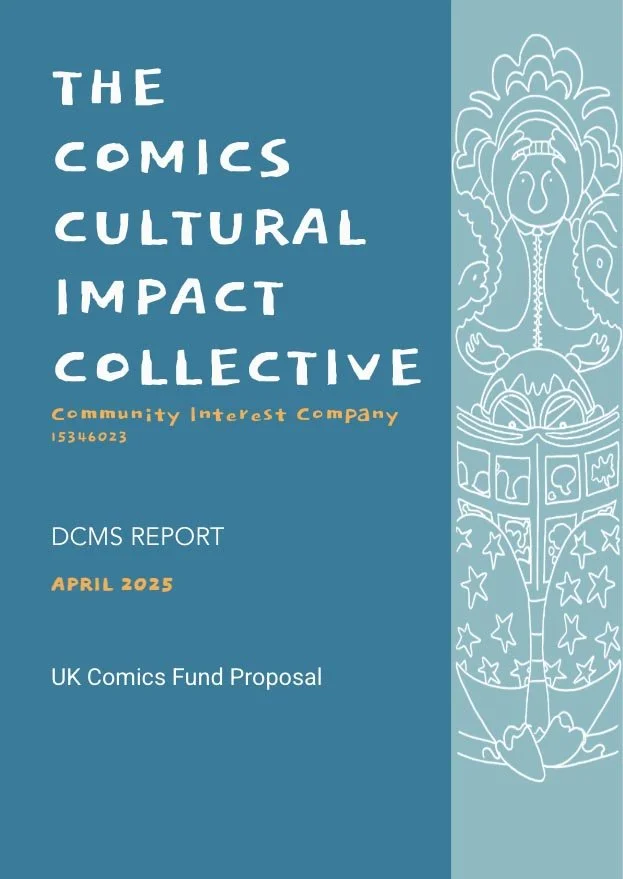CCIC - A Longer Game (and a Personal View)
I’ve added my signature to the Comics Cultural Impact Collective (CCIC)’s report, asking the government Department of Culture, Media & Sport for investment in comics.
If you’re visiting this site, you know that I’m a comics creator - what’s popularly known these days as a “graphic novelist” - but you may not know that I also work as an editor and consultant in publishing and as a graphic recorder for the corporate world. My whole background is publishing - magazines, comics, books. I have to do all the extra (albeit related) jobs to support making comics.
The comics scene in the UK is unique, with so many creative, talented artists expressing themselves through zines, comics and graphic novels. There is such huge potential — but right now, opportunities are scarce.
“Comics” is a worldwide industry, whatever it’s called locally - Manga, Banda Desenhada, Fumetti - and it tends to be thought of by mainstream publishing and media as a medium, a slightly misunderstood adjunct to the purity of text, of the “literary.”
It’s much more than that. It’s a visual language, one that has colonised all corners of communication and expression throughout the world. It is everywhere, from the messaging app on your smartphone to your home screens. Its forms of grammar and approach of sequential thinking and problem solving have been adopted by the corporate world, by big tech, by the gaming industry, by advertising, by Hollywood. It is, in purely economic terms, big business.
In more human terms, as a medium of personal expression, it is the most accessible art form humankind ever invented. All you need is a pencil and paper. It’s a great way of teaching our children how to read, especially reluctant readers. It is expanding all the time, and we’ve barely dug into its potential. As a language, the applications are numerous, lucrative and enriching on both a personal and a civilizational level.
Yet, in the UK, it is not noticed enough, barely invested in, rarely celebrated in mainstream media in the way it should be, as a part of our nationwide cultural heritage.
Comics has taken me all over the world. I’ve worked hard, I’ve been determined, I’ve been lucky, but, fundamentally, it is this language of sequential visual thinking that took me to all those places, that allowed me to have all those work experiences and collaborate with clients like Chanel, EY, Coca-Cola, to name but three.
Had there been greater support when I was younger, I might not have moved to the USA, “in search of opportunity.” There might’ve been more award-winning graphic novels like Laika, or that continuation of Hugo Tate that I’m always going on about. (Bit of a deep cut there, for those that know. By the way, I’m back in Europe now, and yes, I include the British Isles in my definition of Europe.)
It’s not easy making comics. It takes a huge investment of time and energy to create a properly researched, literate graphic novel that can appeal to a wide readership.
A lot of people make comics, or manga, or bande dessinée, because they love the language and the freedom it gives them. You can only sustain yourself on love for your medium and craft for so long though, and ultimately it’s not enough. The UK is home to much extraordinarily imaginative talent that deserves both investment and recognition.
CCIC’s report, based on robust research, has been created in consultation with the UK’s grassroots comics community, and clearly sets out a path to a stronger comics culture in the UK, one that could happily compete on a global scale.
Please take the time to read the report yourself here, to see how support from the government could help provide new opportunities for comics creators, publishers, booksellers, festivals — and everyone in comics — capitalising on the potential of our wonderful artform, and ultimately creating a viable comics culture in the UK.
Why not sign it too? Please support us by adding your name here ...
You’ll be in good company — along with Thought Bubble Festival, THE CARTOON MUSEUM LIMITED, The Society of Authors, Association of Illustrators DACS, National Literacy Trust, Wellcome Trust Collections, Royal Society of Literature, The Beano, Afroflux, Comics Youth, LDComics and many many more.

